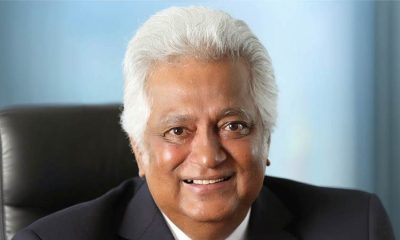Opinion
The Unforgettable Nihal Jayamanne
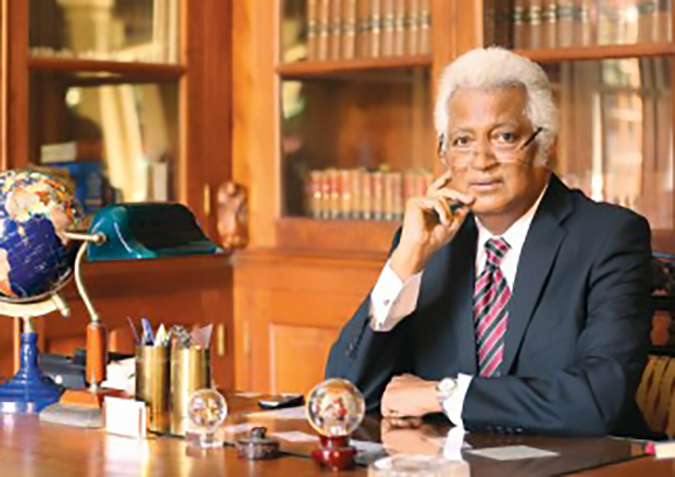
Time and tide waits for no man. It has been one year since Nihal Jayamanne PC, eminent and senior counsel, a past president of the Bar, a well-loved personality, and a wonderful man, passed away. He is deeply missed, by friends, colleagues and juniors at the Bar, but none so much as by family for whom he was the light that shone brightly. Though the lamp is out, its warmth remains with love and fond memories of times gone by.
Nihal Michael Jayamanne, uncle Nihal to me, came into my life when I was but a toddler. At the time, he was an apprentice of Mr. Samuel J. Kadiragamar QC, and he would bunk his apprentice time with Mr. Kadiragamar at Queens road and walk over to my grandfather’s house to court my aunt Rohini who then was a science undergraduate at the Colombo University and had been introduced to him by his brother who was at the same Faculty at that time. They married and enjoyed 49 plus years of life together, till death parted them. She was the wind beneath his wings.
Uncle Nihal was a man of many parts; witty, intelligent, sporty, kind and compassionate, interested in the arts, and above all, a man who could relate to all persons in society, young and old. In this respect he was indeed a man who could walk with kings and not lose the common touch.
In the early days I remember him as a really fun character who would relate entertaining stories. I also enjoyed going about with him as he had a spanking new Peugeot which he drove very fast. Among my many childhood memories of him is that he bought me my first TinTin book. I was so hooked on to it that I persuaded my father to walk with me to the book shop at the Dasa building at Bagatalle road to buy the rest of the series.
As I grew older he would chastise me saying that I belonged to a generation that watched television and did not read enough. On his many visits to our house where he would wait after court to pick up my aunt from work, he would challenge me to take a broader view of life, embracing all faiths and points of view. He introduced me to the Desiderata and would stress one of its phrases; “…listen to others, even the dull and the ignorant; they too have their story”.
I was also encouraged by him to read Fritjof Capra’s “Tao of Physics” about the dance of sub atomic particles, and to see how that compared to the Hindu view of the Universe. As a teenager I was fascinated by this man, my uncle, who was a lawyer by profession but knew all these other things about science, nature, the arts and humanities – he would ask me to look up things like the Chandrasekhar Mass which is the critical mass of black holes and how this Nobel prize winning theory had been developed by Chandrasekhar an Indian while on his way by ship to England to accept a scholarship at Cambridge University.
Uncle Nihal did this for two reasons; not only to get me thinking but also to emphasize that it is we in the east who were responsible for some of the most interesting ideas that have come about. His varied interests were reflected in the art and artefacts he collected. Starting out as a cabinet of curiosities, in later years his whole house began to resemble a museum and art gallery with all manner of things and works of art. Mr. K. Kanag- Isvaran PC, his good friend of many years paying tribute to him at the unveiling of his bust at the Colombo Law Library recently, mentioned that it was rare to have a man with all these varied talents and drew attention to the fact that uncle Nihal had donated a valuable statue of Nataraja from his collection of artifacts to a Hindu temple at which the statue is presently venerated.
Nowadays one often hears of appeals to help small vendors on the basis that it is “an act of charity wrapped in dignity”. I learned this from uncle Nihal many years ago before it became fashionable to call it that. During my school holidays he would invite me to join him to go to outstation courts. He had no juniors then, and I read his briefs aloud for him in the car as he drove to refresh his memory.
On the way back he would often stop on a by-road to buy something that a little boy or girl was selling, not because he needed it but to help them. He would say; “do you know how hard they work to make that thing. You have it easy, they use that money to buy books”. Not only that, he would stop and chat with them, and per chance if they were playing a game, join in it too. As part of my scout activities when I was learning to identify trees by their leaves uncle Nihal would point out that any of these village boys or girls that we met on our travels could do that effortlessly.
He himself was very fond of nature and took a special interest in trees, planting various large trees on his family’s property. He was very happy to see them grow and bloom. In this respect he was creating carbon credits and was ahead of his time. Another fashionable phrase in the modern world is “be here now”; this too I learned observing uncle Nihal, not by reading books. He lived life in the present, was focused and enjoyed the moment. Positive thinking came naturally to him, so much so that whenever I was in a difficult situation I would ask myself; what would uncle Nihal do if he was in my place. I told this to him when he himself was very ill later in life. His positive thinking and that of his supportive wife and son Tilanka who left no stone unturned to find the medical attention required, enabled him to successfully survive a double lung transplant.
All who knew him as an adult knew him to be extroverted; he joked and laughed and enjoyed engaging with other people. A vivid memory I have, is of him dancing the tango with a rose between his teeth on December 31 to usher in the Millennium. Charles Spencer Chaplin said that a day in which one does not laugh is a day wasted. Uncle Nihal did not waste a single day, he laughed, joked and smiled every day that I knew him. His mother however, used to recall and tell us that he was not always like that and that as a child he was a shy boy; something we found very hard to believe!
Born to Bernadette (Bernie) and Senator J.M. Jayamanne, he was the second in the family and their first son. His siblings are Joan an elder sister who is an Attorney at Law and Bandula (Bandu) his younger brother who is a Chemistry Honours graduate. Uncle Nihal, schooled at St. Joseph’s College, was a Senior Prefect and captained the Tennis team. Recalling his school days, he would tell me what a great man Fr. Peter Pillai, the Rector of St. Josephs was and how he had a plethora of multi-disciplinary qualifications. Perhaps Uncle Nihal got his inspiration for his wide spectrum of interests from Fr. Pillai.
He took to law, and his leadership skills were recognized even at the Law College where he was elected President of the Law Student’s Union. Despite his father being a very successful lawyer in his time, a Senator and Minister of Justice, uncle Nihal chose to walk the path of his legal career on his own with no senior; starting at the very bottom. His success was all his own having built up a civil practice in the outstation courts at Homagama and Gampaha and thereafter in Colombo, both in the original and appellate courts. He appeared in many high profile cases and was held in very high esteem by the Bench and the Bar.
From a young age he was a member of the Law Commission which is charged with looking into amendments of the law. He went on to be its Chairman and was responsible for proposing many useful amendments to both substantive and procedural laws.
He was successively elected as President of the Bar Association. During his tenure as President of the Bar, on the suggestion of Judge C.G. Weeramantry who was the then Vice President of the International Court of Justice, he initiated the “Law Week”; a program for the Bar to interact with the pubic and solve their issues. This event has thereafter been successfully held annually.
Uncle Nihal’s reputation was not restricted to the Bar of Sri Lanka, he was elected deputy President of SAARC Law, President SAARC Law – Sri Lanka Chapter, and I was pleasantly surprised to find him on the Board of Trustees of the SAARC Law Centre of a leading Indian University which I visited. The Commercial world not only sought his counsel but wanted him to be on several Boards, most notably he was the Chairman of Seylan Bank.
At the peak of his career, he was diagnosed with idiopathic pulmonary fibrosis in his lungs. Being the positive thinker that he was, he continued working though given two years to live post diagnosis. We did not see any difference in him, attributing his tiredness to overwork. When this condition came to its peak he was very fortunate to have come across a compatible donor thereby enabling him to have a double lung transplant – the first time such a surgery was performed in Sri Lanka. The average life span of a person with such a transplant is five years post-surgery, Uncle Nihal’s positive thinking and supportive family enabled him to double that and live a decade thereafter.
He used that time well, to be with family, pursue his interests and watch his son Tilanka who graduated in law get married to Lydia, an Attorney at Law. In that time, he also returned to practice and completed 50 years at the Bar – a feat most practicing lawyers look forward to celebrating, because it is not an easy milestone to reach not only due to its professional rigour, but also because one has to live that long to celebrate it. We were all glad he made it to that point; I have on the mantelpiece a photograph of the two of us in celebration of that event, which I will continue to treasure.
The next milestone he looked forward to was his golden wedding anniversary in October 2022. Coincidentally, my uncle and aunt got married on my birthday and it was indeed something that we all would have liked to celebrate. Alas it was not to be, he passed away on June 14, 2022 after a brief illness, four months short of that anniversary. He was a good man, who lived a good life and was fortunate to have a loving family that enjoyed life with him.
Little known to the wider world was that in addition to his painting skills, he had an excellent voice and enjoyed singing Dean Martin, Sinatra and Nat King Cole songs and even recorded some of them. A senior member of the Bar having learned of this stopped me recently in the Supreme Court and asked me, “when are you going to give me a CD of your uncle’s songs” to which I replied that it is on You Tube and could be down loaded.
‘Unforgettable’ by Nat King Cole was one of his favorite renditions. The words of that song express the emotion and thoughts of all of us who knew him well. Nihal Jayamanne will remain;
“Unforgettable in every way,
And forever more, that’s how [he] will stay”.
Rajiv Goonetilleke
Deputy Solicitor General
Opinion
Learning from global models to address flooding and water shortage in Sri Lanka

by Sudharman Siripala
Sri Lanka is grappling with the increasing threat of climate change, which has led to unpredictable weather patterns. The country faces a dangerous combination of flooding in some regions and water shortages in others, a situation exacerbated by shifting rainfall patterns. Rivers originating in the Central Hills, such as the Mahaweli, Kalu, and Kelani, flow through much of the country, but these water sources are not being distributed evenly. Districts like Monaragala and Hambantota, located in the dry zone, are experiencing severe water shortages. To address this challenge, experts suggest the development of an interconnected river system to harness excess water during floods and redirect it to drier areas, ensuring a year-round water supply for agriculture and daily use.
Global Case Studies in River Management
Several countries facing similar water-related challenges have implemented successful water management systems that Sri Lanka could adapt to its unique circumstances:
The Netherlands – Room for the River Programme
The Netherlands, a country prone to flooding, widened its rivers and relocated dikes to create floodplains. This approach allows rivers to overflow without damaging urban areas, while preserving water flow and natural habitats. Sri Lanka could apply this concept by designating specific riverbank areas for temporary flood storage.
China – South-North Water Transfer Project
China’s massive project channels excess water from the flood-prone Yangtze River to drier northern regions. This system of canals and reservoirs could inspire Sri Lanka to divert water from rivers in the Central Hills to drier areas in the south and east.
Bangladesh – River Interlinking Projects
Bangladesh has implemented river interlinking projects to redistribute water from flood-prone rivers, such as the Brahmaputra, to drier regions. Sri Lanka could link its major rivers like the Mahaweli and Kelani to smaller rivers in water-scarce districts to balance water distribution.
India – National River Linking Project
India’s National River Linking Project connects major rivers to manage both floods and droughts. Sri Lanka could use similar strategies, connecting rivers around the 500-foot contour line in the Central Hills to help distribute water more effectively.
United States – Mississippi River and Tributaries Project
The Mississippi River system combines levees, floodways, and diversion channels to manage flooding. Sri Lanka could adopt similar flood-control measures in vulnerable river basins such as the Kelani and Kalu.
Japan – Underground Reservoirs and Flood Channels
Japan’s G-Cans Project in Tokyo channels excess water into underground reservoirs to prevent urban flooding. A similar underground system could be implemented in Colombo and other flood-prone cities in Sri Lanka.
Singapore – Marina Barrage
Singapore’s Marina Barrage serves as both a flood control measure and a water supply resource. Sri Lanka could develop similar systems to control flooding in urban areas and ensure water availability during dry spells.
Thailand – Chao Phraya River Basin Management
Thailand uses diversion channels in the Chao Phraya River Basin to prevent flooding in Bangkok and direct water to agricultural areas. Sri Lanka could replicate this by creating diversion channels to supply water to its agricultural zones.
Actionable Solutions for Sri Lanka
Develop an Interconnected River System
Establish water diversion channels along the 300-500 meter contour lines of the Central Hills to capture excess rainfall during floods and redirect it to drier areas.
Build Reservoirs and Storage Tanks
Construct reservoirs to store diverted water, ensuring a steady supply for agriculture and domestic use. Sri Lanka has around 14,000 ancient tanks out of 30,000 that could be revitalized for this purpose.
Improve Urban Flood Defenses
Drawing inspiration from Japan and Singapore, build underground reservoirs and flood channels in cities like Colombo to mitigate urban flooding.
Strengthen Watershed Management
Restore natural floodplains and create wetlands to absorb excess rainwater, as seen in the Netherlands, helping to reduce flood risks.
Encourage Public-Private Partnerships
Foster collaboration between the public and private sectors to fund large-scale water management infrastructure, leveraging models from China and the United States.
Leverage Technology
Utilise modern forecasting and real-time water management systems, similar to those in Bangladesh and Thailand, to monitor water levels and manage river flows dynamically.
International Collaboration
Form partnerships with countries that have successfully implemented flood control and water management systems to share expertise and technology.
Sri Lanka’s dual challenges of flooding and water scarcity, compounded by climate change, require immediate action. By developing an interconnected river system and learning from successful global water management models, Sri Lanka can mitigate the effects of floods while ensuring a sustainable water supply for agriculture and daily life. It is crucial for the country to act now, as these solutions have the potential to transform Sri Lanka’s water management system for the better.
Sudharman Siripala Managing Director of Geoinformatics Group and a Registered Licensed Surveyor, specializes in geo-spatial applications. He also serves as a freelance value chain consultant for Vivonta Green Tech Consultants (www.vivonta.lk)
Opinion
Doctor’s plight

Some people have found fault with a female doctor for not coming forward to identify her rapist and help make him pay for his crime.
Do they not realise the emotional toll of facing her rapist again?
There should be a way for survivors to testify directly to the judge without enduring such distressing encounters. Making a victim relive her trauma in this manner is akin to subjecting her to the ordeal all over again.
A Ratnayake
Opinion
Developing attitudes of schoolchildren for development
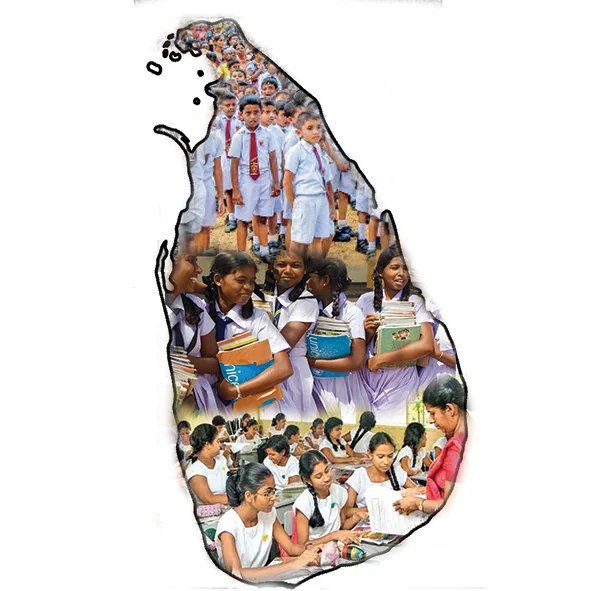
Sri Lanka was once at an economically comparable level with some of the world’s most developed countries in the 19th century. However, despite our country’s potential, we are still striving to fully develop. Many people often blame politicians, government officers, or various sectors for the situation. However, I believe the root cause of these issues lies not in any individual or group, but in the lack of good attitudes within our society.
We are investing significant resources into our education system, which is funded by the taxes of hard- working citizens. However, when we examine the outcomes, we realise that the academic achievements of our graduates alone are not enough. There are instances where professionals, despite having the necessary qualifications, fail to uphold ethical standards. In some cases, this even results in malpractice or harmful actions that damage our country’s reputation and progress. This highlights the gap between academic success and real-world responsibilities.
The education system, which is currently focused on competitive exams and rote learning, does not emphasise the development of attitudes and character in students. While our students are academically capable, many lack the qualities required to contribute positively to society. This lack of focus on social values, such as patriotism, selflessness and respect for elders, is holding us back from achieving the level of progress we deserve.
To address these concerns, I wrote to His Excellency, the President of Sri Lanka, on 24th September 2024, proposing education reforms that emphasise not only academic qualifications but also attitudes, ethics, and social responsibility. I suggested a holistic approach to university admissions and government recruitment, incorporating moral integrity, character, and extracurricular involvement, key traits for fostering well- rounded, responsible citizens. More importantly, I strongly recommended introducing a compulsory school subject, with both theory and practical components, focused on attitude development, which would be evaluated in university admissions. Encouraging extracurricular participation alongside academics will help shape ethical and socially responsible individuals.
I am pleased to inform you that the President, recognising the importance of these reforms, has directed the relevant ministries (by a letter dated 24th October 2024) to explore integrating these ideas into the education system. This marks a crucial step in transforming the values and attitudes of our youth for the nation’s benefit.
However, meaningful change requires collective effort. Parents, teachers, students, and citizens all play a role in shaping Sri Lanka’s future. Together, we must instill responsibility, ethics, and patriotism in the next generation. I invite you to share your thoughts and suggestions on further enhancing the values and attitudes of our youth. Your feedback will be invaluable in building a brighter future for Sri Lanka, one driven not just by knowledge, but by integrity and character.
Dr. Mahesh Premarathna
Research Fellow, National Institute of Fundamental Studies, Sri Lanka Email: mahesh.pr@nifs.ac.lk
-

 News6 days ago
News6 days agoSeniors welcome three percent increase in deposit rates
-

 Features6 days ago
Features6 days agoThe US, Israel, Palestine, and Mahmoud Khalil
-
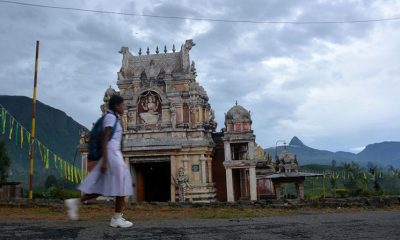
 News6 days ago
News6 days agoScholarships for children of estate workers now open
-
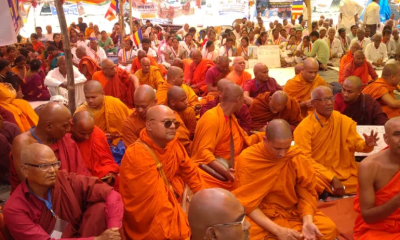
 Foreign News5 days ago
Foreign News5 days agoBuddhism’s holiest site erupts in protests over Hindu ‘control’ of shrine
-
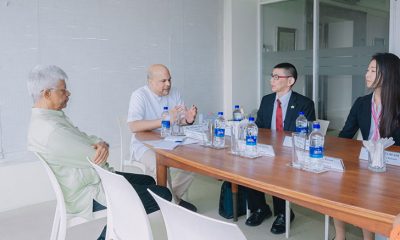
 News6 days ago
News6 days agoJapanese Defence Delegation visits Pathfinder
-

 Features3 days ago
Features3 days agoCelebrating 25 Years of Excellence: The Silver Jubilee of SLIIT – PART I
-

 Editorial5 days ago
Editorial5 days agoWhen tractors become cars!
-

 Business3 days ago
Business3 days agoCEB calls for proposals to develop two 50MW wind farm facilities in Mullikulam


